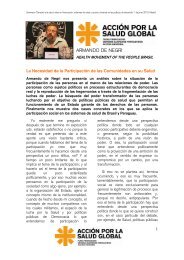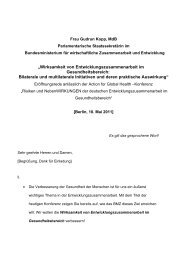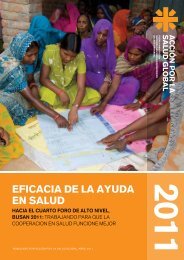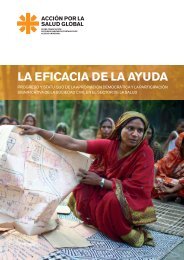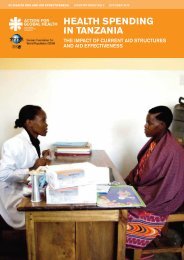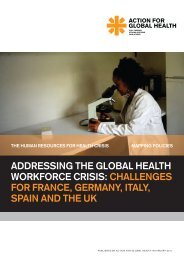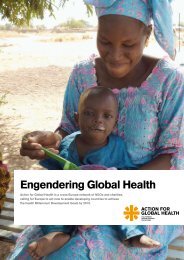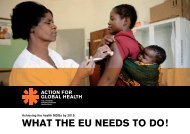Ethiopia Aid effectiveness in the health sector - Action for Global ...
Ethiopia Aid effectiveness in the health sector - Action for Global ...
Ethiopia Aid effectiveness in the health sector - Action for Global ...
You also want an ePaper? Increase the reach of your titles
YUMPU automatically turns print PDFs into web optimized ePapers that Google loves.
<strong>Ethiopia</strong> – <strong>Aid</strong> Effectiveness <strong>in</strong> <strong>the</strong> <strong>health</strong> <strong>sector</strong><br />
Executive summary<br />
<strong>Ethiopia</strong> is <strong>the</strong> second largest country <strong>in</strong> Africa by population; 84% of people<br />
live <strong>in</strong> rural areas. The start<strong>in</strong>g po<strong>in</strong>t <strong>in</strong> terms of development <strong>in</strong> <strong>Ethiopia</strong> was<br />
poor and guarantee<strong>in</strong>g access to basic <strong>health</strong> services depends on heavy and<br />
long term <strong>in</strong>vestments. Difficulties are fur<strong>the</strong>r <strong>in</strong>creased by <strong>the</strong> country’s difficult<br />
topography.<br />
Strong economic growth and <strong>in</strong>novative <strong>health</strong> programmes <strong>in</strong> <strong>the</strong> <strong>health</strong><br />
<strong>sector</strong> are lead<strong>in</strong>g to important improvements <strong>in</strong> <strong>health</strong> services. Still, progress is<br />
far from optimal. Both maternal and under-five mortality rates will have to<br />
decrease by half <strong>in</strong> order to meet Millennium Development Goals (MDGs) 4<br />
and 5 by 2015.<br />
More effective aid should help to speed up progress <strong>in</strong> <strong>the</strong> <strong>health</strong> <strong>sector</strong>, but<br />
political disagreements result<strong>in</strong>g from <strong>the</strong> Government’s poor record on human<br />
rights are hold<strong>in</strong>g back advances on alignment and harmonisation. Despite<br />
good progress on poverty reduction and <strong>health</strong> <strong>in</strong>dicators, <strong>the</strong> situation is at<br />
stalemate and it is not likely to change <strong>in</strong> <strong>the</strong> short term. In addition, vertical<br />
donors rema<strong>in</strong> outside alignment and harmonisation ef<strong>for</strong>ts, hence limit<strong>in</strong>g <strong>the</strong><br />
amount of progress which could be achieved.<br />
<strong>Ethiopia</strong> was one of <strong>the</strong> first countries where <strong>the</strong> Government and donors<br />
signed an International Health Partnership and Related Initiatives (IHP+)<br />
Compact. However, full implementation seems unlikely <strong>in</strong> <strong>the</strong> short term. Donors<br />
are reluctant to start deliver<strong>in</strong>g on <strong>the</strong>ir commitments because of <strong>the</strong>ir political<br />
differences. In addition, <strong>the</strong> IHP+ does not <strong>in</strong>clude <strong>Ethiopia</strong>’s largest donors, <strong>the</strong><br />
<strong>Global</strong> Fund and <strong>the</strong> US President’s Emergency Plan <strong>for</strong> AIDS Relief (PEPFAR),<br />
which constra<strong>in</strong>s <strong>the</strong> <strong>in</strong>itiative and its outcomes.<br />
Major vertical donors <strong>in</strong> <strong>Ethiopia</strong> are show<strong>in</strong>g positive signs of change. The<br />
<strong>Global</strong> Fund is mak<strong>in</strong>g ef<strong>for</strong>ts to <strong>in</strong>crease <strong>the</strong> impact of its activities on <strong>the</strong><br />
<strong>health</strong> <strong>sector</strong> overall. PEPFAR has announced a move towards better alignment<br />
and harmonisation as pr<strong>in</strong>ciples of <strong>Aid</strong> Effectiveness (AE), but it still has to put<br />
this <strong>in</strong>to practice. However, one should not expect to see a radical<br />
trans<strong>for</strong>mation of <strong>the</strong>se donors. Internal regulations limit <strong>the</strong>ir movements and<br />
chang<strong>in</strong>g <strong>the</strong>m will take time.<br />
“Democratic ownership” is still miss<strong>in</strong>g <strong>in</strong> <strong>Ethiopia</strong>. The Government is show<strong>in</strong>g<br />
leadership <strong>in</strong> aid processes but it is not contribut<strong>in</strong>g to creat<strong>in</strong>g an enabl<strong>in</strong>g<br />
environment <strong>for</strong> Civil Society Organisations CSOs. The role of CSOs and<br />
Parliament is <strong>the</strong>re<strong>for</strong>e weak. The situation of CSOs work<strong>in</strong>g <strong>in</strong> <strong>the</strong> <strong>health</strong> <strong>sector</strong><br />
is better but poor access to f<strong>in</strong>ancial resources and lack of capacity are still<br />
problems. Moreover, some donors such as <strong>the</strong> US Agency on International<br />
Development (USAID) prefer to work with International Non-Governmental<br />
6



